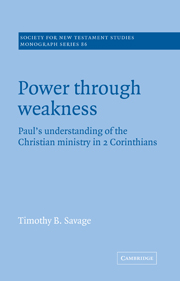Book contents
- Frontmatter
- Contents
- Preface
- List of abbreviations
- Introduction
- PART I POWER THROUGH WEAKNESS: THE BACKGROUND
- 1 The social setting of first-century Corinth: an historical examination
- 2 The situation in the Corinthian church: a biblical analysis
- PART II POWER THROUGH WEAKNESS: THE MEANING
- Conclusion
- Appendix
- Select bibliography
- Index of passages cited
- Author index
- Index of names and subjects
1 - The social setting of first-century Corinth: an historical examination
Published online by Cambridge University Press: 20 August 2009
- Frontmatter
- Contents
- Preface
- List of abbreviations
- Introduction
- PART I POWER THROUGH WEAKNESS: THE BACKGROUND
- 1 The social setting of first-century Corinth: an historical examination
- 2 The situation in the Corinthian church: a biblical analysis
- PART II POWER THROUGH WEAKNESS: THE MEANING
- Conclusion
- Appendix
- Select bibliography
- Index of passages cited
- Author index
- Index of names and subjects
Summary
The Graeco-Roman world
We may begin our historical analysis by looking at the way in which people evaluated their peers and religion in the Graeco-Roman world at large.
The appraisal of fellow-humans
Individualism
The hellenistic age was marked by the decline of the city-state with its close-knit social bonds and by the rise of individualism. No longer was corporate solidarity the ideal. Instead people cultivated a rigorous self-sufficiency (αύτάρκεια). Philosophers stressed human autonomy and ethicists called for individual initiative. Consequently, people began to focus on themselves and in particular on cultivating their self-worth. For many, self-appreciation became the goal and self-glorification the reward.
Status
In Roman society rank was a prized possession. It determined one's behaviour, relationships and legal privileges. All people belonged to one of two classes: the honestiores or the humiliores, the high or the low. The former was made up of the nobility – senators, equestrians and, away from Rome itself, decurions. These were men who, together with their womenfolk, were esteemed for their dignitas and often possessed great power and fortune. The humiliores – plebs, freedmen and slaves – lacked dignitas and were held in no honour by the nobility. Since rank was hereditary, movement from one class to the other was virtually impossible. Yet there was social mobility.
- Type
- Chapter
- Information
- Power through WeaknessPaul's Understanding of the Christian Ministry in 2 Corinthians, pp. 19 - 53Publisher: Cambridge University PressPrint publication year: 1995

